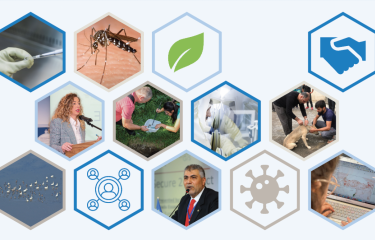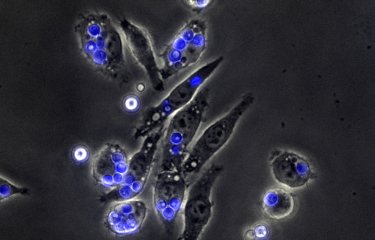After more than three years of activities in the underprivileged regions of the Centre and South of Tunisia, the second phase of the ATun-DIP's project (Improvement of the management of Tunisian children suffering from Primary Immunodeficiency Diseases) started on February the 4th, 2021. The project, coordinated by the Institut Pasteur de Tunis in collaboration with several partners including the Institut Pasteur, now extends to the disadvantaged regions of North-West Tunisia. It focuses in particular on strengthening the molecular diagnostic capacities of the Institut Pasteur de Tunis to promote early diagnosis of this pathology, which is still under-diagnosed today.
DIPs (Déficits Immunitaires Primitifs in French for Primary Immunodeficiency Diseases (PIDs)) are linked to genetic abnormalities in different components of the immune system. These abnormalities result in repeated infections that can be life-threatening. Tunisia is particularly affected by PIDs as the latter is fuelled by the consanguinity that can reach up to 50% of marriages in certain regions. Unfortunately, these diseases remain largely under-diagnosed, whether in children or in moderate forms in adults, most often due to its poor understanding by the medical community or the lack of appropriate diagnostic means.
In the light of this observation, the Institut Pasteur de Tunis launched at the end of 2015 the first phase of the “ATun-DIP's” project. Supported by the Department of International Cooperation of Monaco, the aim of the first phase was to improve the knowledge of healthcare professionals (paediatricians, nurses and biologists) on these deficiencies in order to establish early diagnosis and improve the specific care of children with PIDs. At the same time, actions to raise awareness of the warning signs of these deficiencies and the prevention of infectious episodes have been carried out among families. This first phase made it possible to implement an unprecedented comprehensive approach that also led to the creation of a patients' association.
Given the success of this first phase, the actions in the Centre and South regions will be continued but also extended to the disadvantaged regions of North-West of Tunisia. Phase two of the “ATun-DIP's” project will also focus on strengthening the molecular diagnostic capacities of the Institut Pasteur de Tunis. This capacity building, carried out in collaboration with the teams of the sequencing platform (Biomics) and the Department of Computational Biology (DBC) of the Institut Pasteur will make it possible to use modern New Generation Sequencing approaches for more efficient and earlier diagnosis. The aim of these collaborations is to introduce a diagnostic and preventive approach through genetic counselling and prenatal diagnosis for affected families. Finally, the project will no longer be limited to children but will also extend its actions to adults with primary immunodeficiencies.
The launch of the second phase officially took place on February the 4th, 2021 with representatives of each of the project's stakeholders, namely: the Institut Pasteur de Tunis, the Institut Pasteur-Paris, the Principality of Monaco's Department of International Cooperation, the Directorate of Basic Health Care of the Tunisian Ministry of Health, the Faculty of Medicine of Tunis and the Tunisian Association of Patients with Primary Immunodeficiencies (Atun-DIPs), those in charge of the partnership between the Faculty of Medicine of Tunis and the North-West Region. The partners met during an online kick-off meeting due to the current health context. The aim of the meeting was to present the main results of the first phase of the project and to find solutions to overcome the difficulties encountered during the launch of the second phase, which occurred as a result of the COVID-19 epidemic.





